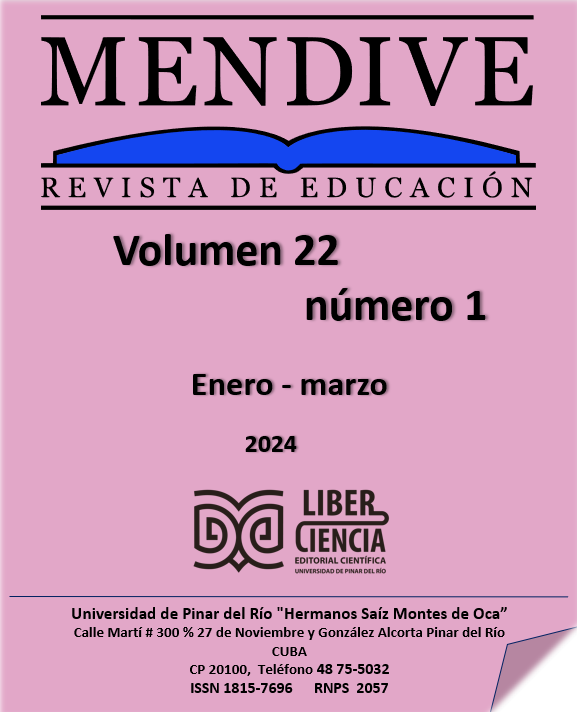Research training in the doctorate of Educational Sciences: promotion of scientific culture
Main Article Content
Abstract
The doctoral education process in Education Sciences, in its continuous improvement, seeks to enhance the development of skills in students at this level, in order to provide them with critical, innovative, and creative knowledge, skills, attitudes, and qualities to address solutions in educational activities, based on the foundations of education sciences. In this direction, the doctoral program at the University of Matanzas enhances the dynamic interrelationship of its components to facilitate individual progress for doctoral students in a unit and articulation of the scenarios and pathways that educational practice places as essential. The objective of this article focused on the result of a cut from the theoretical-methodological-experiential reflection in doctoral training to achieve continuous improvement in educational activity. The application of scientific methods and different techniques and procedures enables the monitoring and evaluation of results in the period from 2020-2023, in the selected sample of those enrolled in 2019. The results reveal outstanding aspects in the construction of new knowledge for doctoral training in Education Sciences. It is concluded that new challenges in doctoral training find strengths in the articulation of mandatory and optional activities of the investigative component.
Downloads
Article Details

This work is licensed under a Creative Commons Attribution-NonCommercial 4.0 International License.
References
Castro-Castillo, G., Villacis Macias, C., Lamus de Rodríguez, T., Moreira- Choez J. (2023). Learning Styles and Academic Performance in Higher Education Students. Journal of Namibian Studies, 33(S2), 4908-4924 ISSN: 2197-5523 (online).
Fernández-Fastuca, L. (2018). Pedagogía de la formación doctoral. Teseo UAI. Colección UAI Investigación. Buenos Aires, Argentina.
Hernández-Sampieri, R., y Mendoza-Torres, C. P. (2018). Metodología de la investigación. Las rutas cuantitativa, cualitativa y mixta. Mc Graw Hill Education. https://virtual.cuautitlan.unam.mx/rudics/?p=2612
Ganga-Contreras, F., Rodríguez-Ponce, E., Castillo, J., y Viancos-González, P. (2023). Situation of the offer Doctorate in Education Programs in Chile. Revista De Ciencias Sociales, XXIX(2), 49-72. https://produccioncientificaluz.org/index.php/rcs/index
García-Barbero, M. (2019). El entorno educativo un factor importante a tener en cuenta. Educación Médica, 20(4), 197-198. https://doi.org/10.1016/j.edumed.2019.06.001
González, J. (2021). La metacognición y su importancia en el desarrollo del conocimiento. Revista de Psicología, 56(2), 123-130. https://www.scopus.com/record/display.uri?eid=2-s2.0 -84985704733&origin=resultslist
Lamus de Rodríguez, T., Moreira-Choez, J y Castro-Castillo, G. (2023). Propuesta de formación docente para incentivo de la resiliencia, la neurociencia afectiva y cognición social de alumnos que estudian en pandemia. Revista Científica UISRAEL, 10(1), 4160. https://doi.org/10.35290/rcui.v10n1.2023.640
Leyva, J. y Guerra, Y. (2020). Objeto de investigación y campo de acción: componentes del diseño de una investigación científica. EDUMECENTRO, 12(3). http://scielo.sld.cu/scielo.php?script=sci_arttext&pid=S2077- 28742020000300241#B17
Martínez Barreiro, L A, Ramos Socarras, A E, y Salgado Selema, G. (2019). La formación doctoral. Una necesidad en la transformación del claustro de profesores de Ciencias Médicas de Granma. Multimed, 23(4), 872-880. Recuperado en 24 de mayo de 2023, de http://scielo.sld.cu/scielo.php?script=sci_arttext&pid=S1028-48182019000400872&lng=es&tlng=es
Ministerio de Educación Superior. (2019). Reglamento de la Educación de Posgrado de la República de Cuba. Gaceta Oficial de la República de Cuba. Gaceta Oficial de la República de Cuba, (13), 13-25
Prieto-Peña, A.I., González-Sánchez, A., Díaz-Díaz A.A. (2023) Importancia social de la preparación pedagógica del tutor en la formación del médico general integral. Rev Méd Electrón, 45(3). http://www.revmedicaelectronica.sld.cu/index.php/rme/article/view/5044/561
Ramos Serpa, G., y López Falcón, A. (2023). Explorando la dimensión filosófica de la cognición humana. Universidad y Sociedad, 15(S2), 150-159. https://rus.ucf.edu.cu/index.php/rus/article/view/3874
Rubio, M. (2023). Procesos lógicos y construcción del conocimiento en la investigación doctoral del contexto educación universitaria. Acción Y Reflexión Educativa, (48), 5569. https://revistas.up.ac.pa/index.php/accion_reflexion_educativa/article/view/3463
Urbay, M, Torres, A M, Carrera, M, y Ortiz, T. (2022). Formación doctoral del profesional de la educación y su impacto social. Revista Cubana de Educación Superior, 41(Supl. 1), 14.
Valiente, P.; Salazar, M.; Domínguez, L.; y Coloma, O. (2020). Estudio sobre las publicaciones realizadas durante su formación por doctores recién egresados de Ciencias Pedagógicas. Universidad y Sociedad, 12(3), 325-336. http://scielo.sld.cu/pdf/rus/v12n3/2218-3620-rus-12-03-325.pdf


